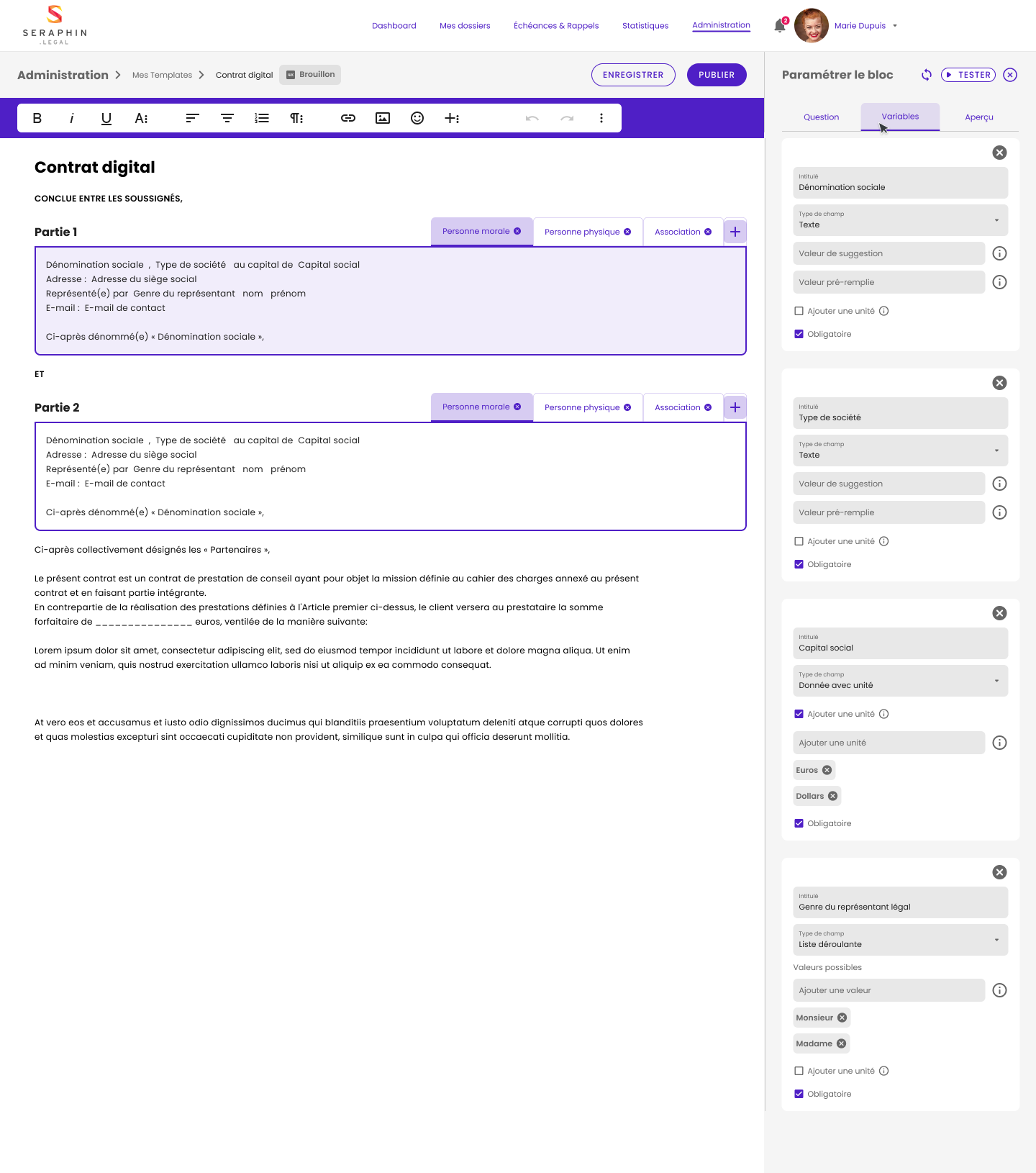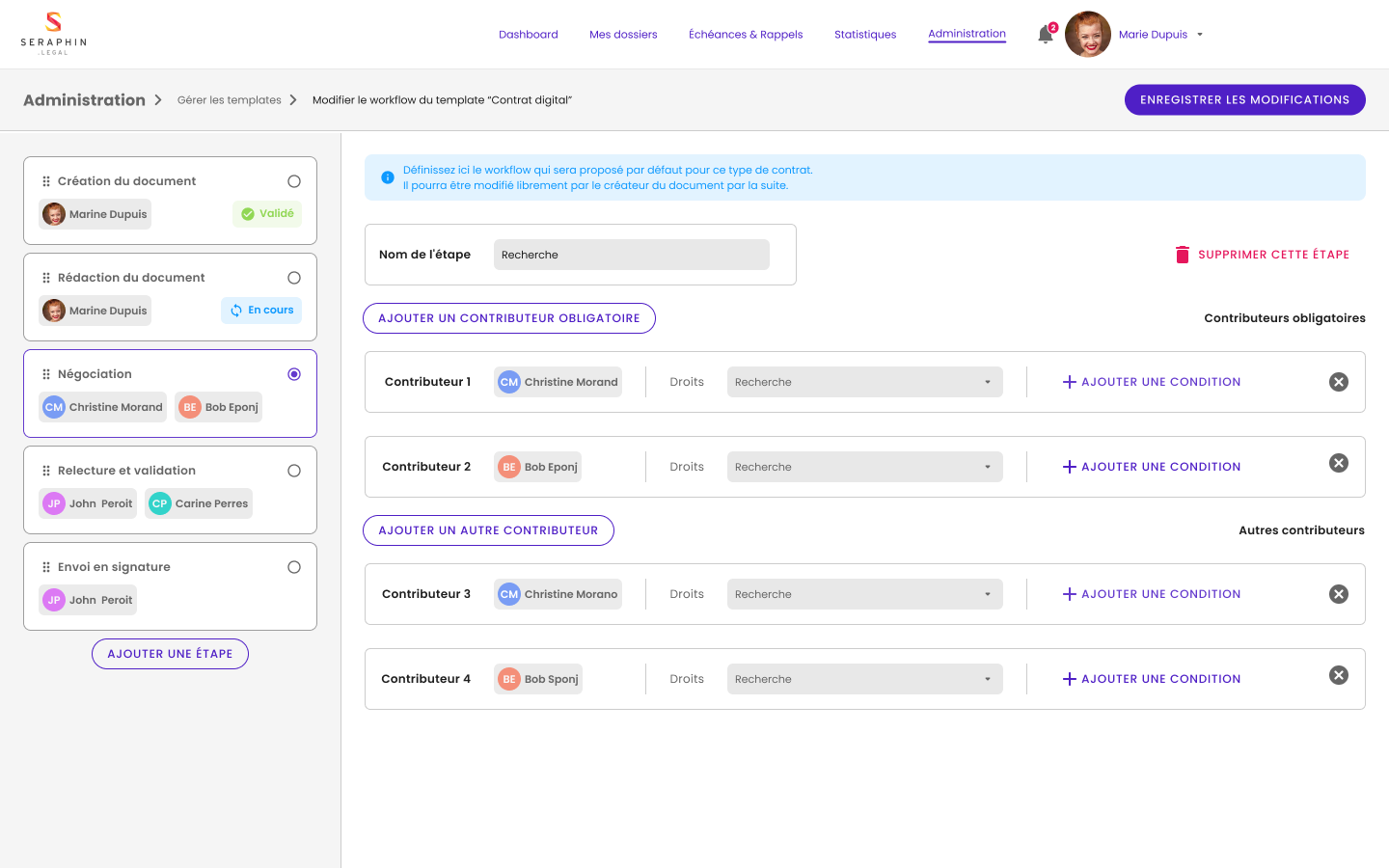What is a delegation of powers?
The delegation of powers is the contract by which a company director (the delegator) delegates certain powers to an employee (the delegatee), thus enabling the latter to perform certain acts in the name and on behalf of the company.
Conditions of the delegation of powers :
✅ The manager must be able to prove his inability to perform the acts mentioned in the contract
✅ The manager must have a legal subordination link to the delegatee
This allows :
- Protecting company directors when certain employees unlawfully engage the company
- To better map the responsibilities of each and thus the mapping of risks
- To make processes more fluid and to give responsibility to certain employees when the manager is no longer able to carry out all the delegated acts.
The scheme of delegation of powers is in a way the skeleton of the company according to Antoine VanwynsbergheAntoine Vanwynsberghe, Legal Manager at Auchan Retail.
Disadvantages of the traditional process
❌ Waste of time: time-consuming, low-value tasks such as drafting a delegation of authority do not allow legal teams to focus on strategic transactions such as a fundraising or business acquisition.
❌ Frustration : Drafting low-complexity employment contracts on a run-rate basis is not the most exciting assignment for a lawyer, even more so if the frequency and volume of these contracts is high. In particular, this can lead to frustration on the part of your legal teams.
❌ Loss of autonomy: Operational staff often regret their lack of autonomy and the delay in obtaining certain simple contracts to create, while some legal teams fear the legal risk that this autonomy may cause.
❌ Legal risks: Many legal teams offer self-service contract templates in word/google format. As the entire contract can be modified by its user, the risk of deleting a term, a clause, a mandatory mention can generate a major legal and therefore financial risk for the company.
❌ Lack of visibility on the contract: Who was involved in this contract? When? On what date was the contract validated and by whom? What is the main information to be retained from this contract? So much essential information for the company for employees who did not intervene on the contract but who need to collect this information to follow up on the employee or even take over the contract following a departure.
| 💡Feedback: During several exchanges with in-house lawyers and contract managersSome of them told us that contracts and contract forms are transmitted internally through word and excel files and moving hypertext links. This practice can lead to information being lost as people leave or move internally, especially when these files are stored locally. |
❌ Manual reporting: setting up a dashboard and offering regular reporting on contract activity can be a real nightmare when information is scattered and inputting. How many contracts have been signed? On what types of items? What is the average delivery time for a delegation of authority? etc.
❌ Lack of reliable monitoring of delegations of authority: Once the delegation has been drafted, negotiated and signed, it is now time to execute it. Yet it is complex to reliably monitor a delegation of authority and track the contractual actions performed by the delegatee if it is a static delegation in text format.
Benefits of an automated process
✅ Time saving: As the legal teams have previously carried out the work of creating a contract library and automating the contracts, they are no longer solicited for the time-consuming aspect of drafting (information gathering, data entry, etc...) but only for their legal expertise (advice, negotiation support, validation etc...).
✅ Leveraging contract data: Beyond simply eliminating time-consuming tasks, automation also ensures data collection. All the data entered to complete a contract is used to enable you to monitor your deadlines, create your contract sheets or even to manage your contractual activity through a statistical dashboard. This data can be communicated with third-party applications used by your company.
✅ Legal security: No more risk of deleting a term, a clause, a mandatory mention that could generate a major legal and financial risk for the company. Only the predetermined and customisable fields can be modified and the rest of the contract is fixed.
| 💡 Good to know: If you have set up the display of a clause to a specific response on the form, this clause cannot be modified by your internal client unless you take action. |
Don't waste any more time signing: Once the delegation of authority has been reviewed and validated by the relevant parties, it is automatically sent for signature to the parties authorised to sign (whether a manager or a delegate of authority).
✅ Gain visibility on the contract: Who was involved in this contract? When did it happen? Who are the internal and external interlocutors? On what date was the contract validated and by whom? What is the main information to be retained from this delegation of powers? This is essential information for monitoring, taking over or auditing a contract, which you will find directly in the document's activity feed.
For a quick and easy understanding, each contract has a summary sheet automatically generated from the essential clauses of the contract (object, duration, amount, deadline, etc.). It is even possible to manually enrich the contract form by adding specific items to be displayed.
✅ Bring your delegations of authority to life: Automate the delegation of authority on the contracts you want. Determine which employee is competent to act for your company. Make the chain of authority reliable and systematise compliance with internal procedures.
How to automate a delegation of powers?
Create a delegation of authority template
In such an automation process, the legal team obviously retains control over the creation of legal acts.
The aim here is to create the legal skeleton, the legally reliable vehicle that complies with the regulations and the company's strategy. It is therefore a standard version that is not customised.
Questions to ask before drafting include
| Questions | Indications |
| What are the mandatory mentions, clauses or terms of a delegation of powers? | This will give you a first rough and static version of your contract. |
| What are the acts delegated by the leaders? | This will allow you to prioritise the construction of your workbook according to priority needs. |
| What variables should be customised on the document? | This will enable you to construct your question form for the contract user. |
What are the most common questions asked by your internal clients regarding delegation of powers? | This will allow you to provide clarity through the drafting of your questions or through help bubbles to guide contract creators. |
Once you have created this standard contract in Word or Google Doc format, there are two ways to automate it:
- Via direct mail (via extensions such as Merge and Mailing)
- Via a no-code editor dedicated to the automation of contracts such as Seraphin.legal

Give ownership to your teams via a self-service offer
Have you ever wondered whether it is necessary to intervene in certain parts of a delegation of authority? It's time to empower your internal clients to be the creators of their own contracts in complete security so that you can focus on your most complex and high priority tasks.
Thus, your internal customers will be able to personalise their contract from a form that will guide them step by step through the completion of the various fields: date, company name, multiple choice question, unique, contract amount, etc.
The generated contract will be updated in real time in the right-hand panel when you complete the form.
Establish a systematic internal approval system
While it is important to delegate the low value-added drafting stage, the approval stage remains crucial since only the delegator can be the originator of this act.
Indeed, among all the stages of the contract life cycle, the internal validation workflow is essential to protect the delegatee and to ensure the conformity of the delegations of authority he grants.
With a dedicated platform such as Seraphin.legal, you can determine the rules applicable to approve a document according to your criteria.
Example: For all delegations of authority to the sales team, the following are authorised to validate the delegation:
- Legal: Marina Duflot
- Director's side : Michel Dupont
Automated internal validation is also an opportunity to give life to all your delegations of authority involving decision-making on contracts. You will be able to condition this according to the nature of the activity, the type of contract, the amount of the contract and to keep track of these actions in the event of an audit or internal control.

| With a dedicated platform such as Seraphin.legalyou can determine the rules applicable to approve a document according to your criteria: type of contract, amount, field of activity, etc. |
Choose to combine contractual performance and legal certainty
No commitment, no credit card.



